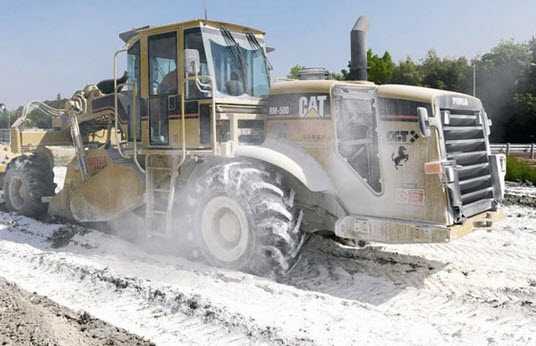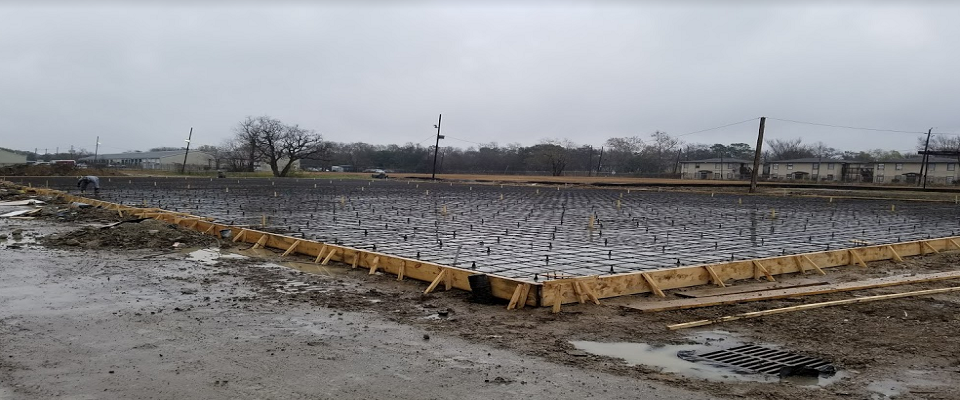Soil/Lime Stabilization

Lime Stabilization Services in Houston
Lime is utilized as an effective way to modify soils – improving both workability and load-bearing characteristics while increasing stability and impermeability. Quicklime and lime kiln dust can also be used to dry wet soils at construction sites, reducing downtime and providing an improved working surface.
The application of lime can significantly improve the engineering properties of soil. There are essentially two forms of improvement: soil modification and soil stabilization. The use of lime can modify almost all fine-grained soils to some extent, but the most dramatic improvement occurs in clay soils of moderate to high plasticity. Modification occurs primarily due to the exchange of calcium cations supplied by the hydrated lime for the normally present cation adsorbed on the surface of the clay mineral. Modification is also caused by the hydrated lime reacting with the clay mineral surface in a high-pH environment: the clay surface mineralogy is altered as it reacts with the calcium ions to form cementitious products. The results are plasticity and swelling reduction, reduced moisture-holding capacity and improved stability.
Soil stabilization occurs when the proper amount of lime is added to a reactive soil. Stabilization differs from modification in that a significant increase in strength is developed over the longer term through an on-going pozzolanic reaction. This reaction results from the formation of calcium silicate hydrates and calcium aluminates as the calcium from the lime reacts with the aluminates and silicates solubilized from the clay mineral surface. This reaction can begin quickly and is responsible for some of the effects of modification. However, the full-term pozzolanic reaction can continue for a long period of time, often for many years. As a result, some soils can produce very significant strength gains when treated with lime. The key to pozzolanic reactivity and stabilization is a reactive soil and a proper mix-design protocol. The results of soil stabilization can include very substantial increases in resilient modulus values, significant improvements in shear strength, continued strength gains over time, and long-term durability over decades of service.
Benefits of Lime Stabilization
If you are interested in understanding the benefits of Lime Stabilization in the greater Houston area, you have come to the right place. Concrete of Houston provides Lime Stabilization services in all areas of Houston. Lime soil stabilization is a process that involves the addition of lime to soil to improve its engineering properties. Lime is a natural product that has been used for centuries to stabilize soils for construction purposes. Lime soil stabilization has numerous benefits that make it a popular choice for a wide range of construction projects.
- Strengthens soil
The addition of lime to soil results in a chemical reaction that strengthens the soil by increasing its bearing capacity and compressive strength. This makes the soil more suitable for construction purposes, as it can better withstand the weight of buildings, roads, and other structures.
- Improves durability
Lime soil stabilization improves the durability of soil by making it more resistant to weathering and erosion. The addition of lime to soil increases its ability to resist the effects of freeze-thaw cycles, which can cause cracking and other forms of damage to soil.
- Reduces soil plasticity
Soil plasticity refers to the degree to which soil can be molded or deformed without breaking. Lime soil stabilization reduces soil plasticity, making it more stable and less prone to settlement. This is especially important in areas with soft or unstable soils, where settling can cause serious damage to structures.
- Enhances workability
Lime soil stabilization enhances the workability of soil by reducing its moisture content and making it easier to compact. This makes it easier for construction workers to shape and mold the soil into the desired form.
- Cost-effective
Lime soil stabilization is a cost-effective method of improving soil properties. It is generally less expensive than other methods of soil stabilization, such as excavation and replacement or the use of geosynthetics.
- Environmentally friendly
Lime is a natural product that is non-toxic and environmentally friendly. The use of lime for soil stabilization reduces the need for other chemicals that may be harmful to the environment.
In conclusion, lime soil stabilization is a highly effective method of improving soil properties for construction purposes. Its numerous benefits, including increased strength and durability, reduced plasticity, enhanced workability, cost-effectiveness, and environmental friendliness, make it a popular choice for a wide range of construction projects.
If you are considering Lime Stabilization for your commercial project, reach out to the experts at Concrete of Houston for a competitive quote. You can reach us at 281-853-8600 or provide more details via our contact us page. http://www.concreteofhouston.com/contact-us/



